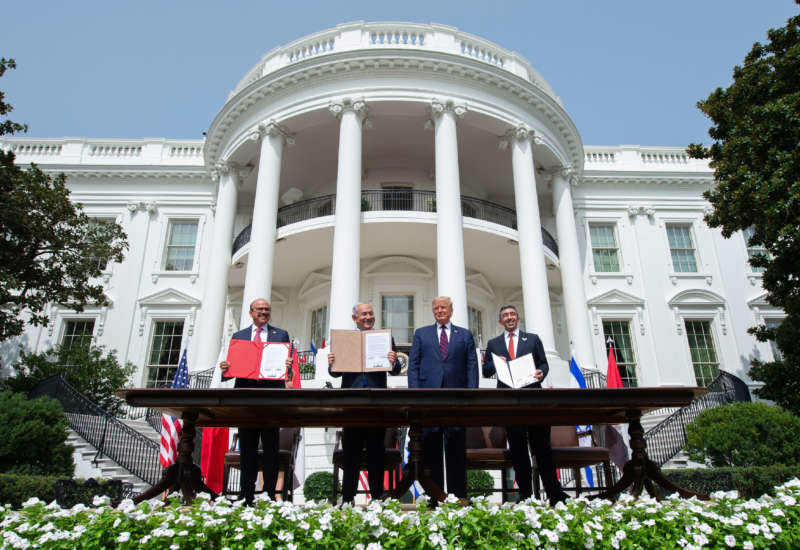

A resolution with wide bipartisan support is being pushed through Congress that would codify one of Donald Trump’s controversial foreign policy initiatives — the so-called Abraham Accords which strengthened U.S. support for Arab dictatorships in return for their formal recognition of Israel.
The Israel Relations Normalization Act Has 329House sponsors, 72 cosponsors in the SenateAlmost equally divided between the parties.
The bill celebrates and seeks to strengthen Trump’s deal which led Bahrain, the United Arab Emirates (UAE), Sudan and Morocco to normalize relations with Israel. Without a series of American actions that essentially amounts to bribery, extortion, none of these countries would have recognised Israel.
The bill asserts that the deals brokered by Trump and his son-in-law and adviser, Jared Kushner, were “peace agreements.” However, except for a small contingent sent by Morocco partway through the October 1973 conflict between Israel and a coalition of Arab states led by Egypt and Syria, none of the signatory countries had ever been at war with Israel. None of these countries were threatening Israel, none of them had the capacity to threaten Israel, and Israel’s distance from these countries range from 750 to 3,200 miles.
If passed, the bill would require the State Department to “develop and submit to the appropriate congressional committees a strategy on expanding and strengthening the Abraham Accords,” including ways in which the U.S. government intends to “leverage diplomatic lines of effort and resources to encourage normalization.”
The “normalization” of diplomatic ties in the 2020 agreements Congress seeks to expand and strengthen were part of a quid pro quo: In 2020, the tiny Gulf sheikdoms of Bahrain and the UAETrump threatened to withhold recognition of Israel if Sudan’s government did not recognize Israel in return to lucrative arms deals with the United States. Sudan’s government agreed to normalize relations with Israel in return for the United States lifting devastating sanctions on that country. Most controversially, Morocco agreed to recognize Israel in return for the United States becoming virtually the only country to formally recognize Morocco’s illegal annexation of Western SaharaSince 1975, the former Spanish colony has been under brutal Moroccan military occupation.
These Arab states have a history of human rights violations and critics of the Abraham Accords should be banned. Bahrain, with the support from Saudi Arabia, the UAE, engaged is a brutal and deadly crackdownIn 2011, the UAE repressed peaceful protests by pro-democracy activists who were non-violent. UAE is also a repressive government that is particularly harsh on foreign workers, who make up the majority. It has been involved in terrorism. war crimes in Yemen. Sudan is ruled by a repressive military dictatorship. violently cracked down on pro-democracy activists after staging a coup this past fall, ousting the country’s civilian-led coalition government. The Moroccan monarchy is continuing its decades-long occupation in West Sahara. Freedom HouseSyria is second in terms of its suppression of political freedoms.
This bill could be seen as part of the decades-long tradition of the U.S. propping up Arab dictatorships suppressing pro-democracy struggles while then justifying its support for the Israeli occupation on the grounds that Israel is “the sole democracy in the Middle East.”
This legislative initiative perpetuates a myth that the key to peace in the Middle East is not in Israel ending its occupation but in having autocratic Arab countries recognize Israel. The bill does not mention the Israeli occupation, nor does it call for its end. It actually reduces the Arab leverage on Israel by recognising that government before Israel recognizes Palestine. This eases Israel’s need to make the necessary concessions to peace. Every Arab country has supported Israel for nearly 20 years. normalization of relationsIn return for Israel’s withdrawal from the occupied territories, and the establishment of a Palestinian state with Israel, we will work with Israel. However, the bipartisan majority in Congress that is sponsoring this bill insists on unilateral recognition by Arabs. This legislation seems to be designed in order to remove any leverage from the Palestinians, one of the few remaining paths to freedom for the millions of Palestinians living under the Israeli occupation and colonization.
The U.S. Congress and successive administrations have made it a priority for both sides to encourage Palestinian countries to recognize Israel. (Indeed. U.S. law requires that all U.S. assistance to any United Nations agency that includes Palestine in its membership must be stopped. This led President Obama and President Trump both to suspend U.S. contributions in 2011 and to withdraw entirely in 2017, resulting a major reduction in efforts to promote peace and international cooperation in education, science, and culture.
The Israel Relations Normalization Act seems to be designed to make peace more difficult despite pro-peace rhetoric. It strengthens the Israeli occupation and weakens nonviolent means of challenging them.
Recent poll of U.S. Middle East scholarsNearly three-quarters of the respondents recognized that the Abraham Accords had a negative impact upon the prospects for peace. Only 6 percent of those surveyed said it had had a positive impact. However, the majority if congressional Democrats agree with their Republican colleagues that the broad consensus of Middle East scholars is wrong and that Trump is right.
